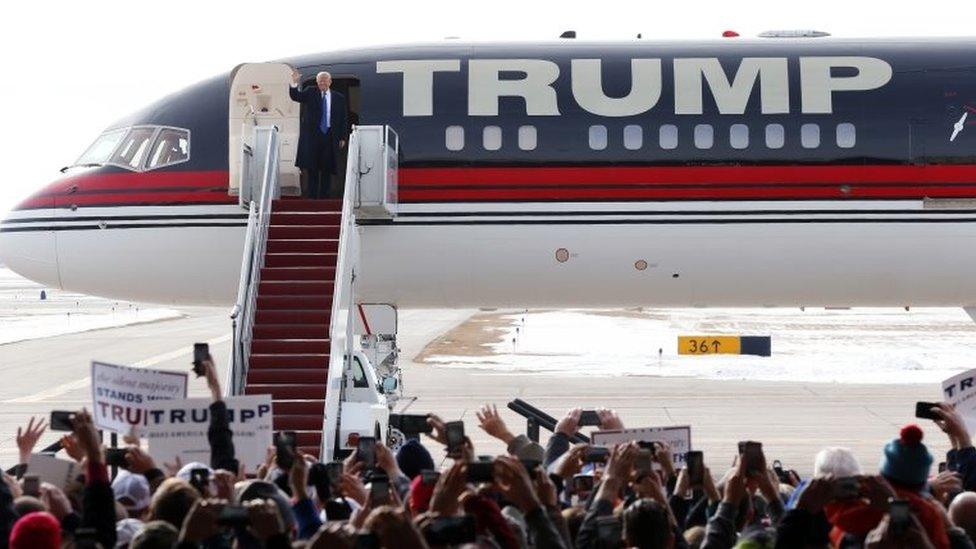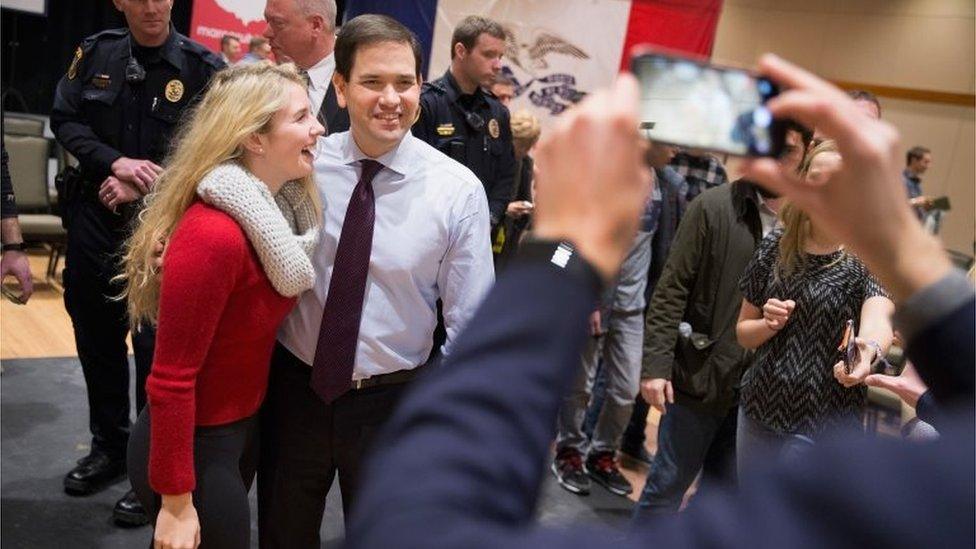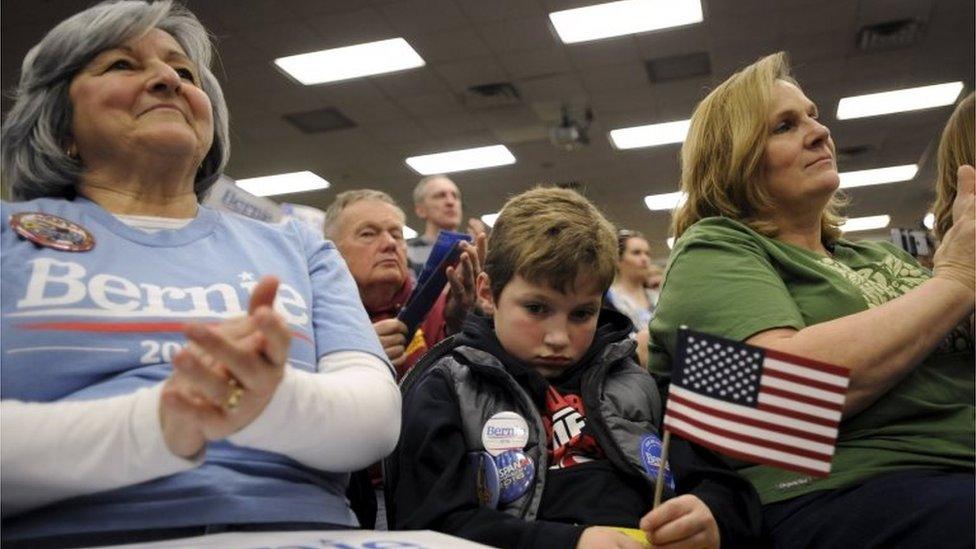US election: All eyes on Iowa in unpredictable race
- Published

Can Donald Trump translate his outsider, unconventional status into votes in Iowa?
This is the most unpredictable, unknowable set of primary races there have been in decades. A year ago, you'd have put your money on it coming down to a fight between Jeb Bush for the Republicans, and Hillary Clinton for the Democrats.
But Jeb - despite spending millions - is nowhere to be seen (please look at the end of this blog for some rudimentary maths - it's extraordinary).
The Republican race has been turned on its head by the billionaire, Donald Trump. Just look at his arrival this weekend in Des Moines on his private jet. Loudspeakers had been put up on the apron.... and music blared out. It was the theme music from the film, Air Force One. Everything he's done has been loud!
There is also a very strong challenge being mounted by the right-wing evangelical senator from Texas - and similar anti-establishment candidate - Ted Cruz.
The two of them a couple of months ago were engaged in the most tender of bromances, heaping praise on each other. But as the race has tightened so the language has changed. In an ugly way.
Those two lead the polls on the Republican side. In third place, but seemingly with momentum behind him, is Florida Senator Marco Rubio. Rivals from another camp confided last night they believed he could still win this contest.

More on the US election

How does a US election work? If you want to be president, it helps to be governor, senator, or five-star military general - and have lots of patience
What would a Trump presidency be like? Imagining the first terms of Mr Trump and other candidates
Shall I compare thee to Iowa: Why the Hawkeye state is like the Oscars, the Luge, and Leicester City football club
Know your election lingo: Americans and Brits quizzed on US political jargon
Special report: The BBC's full coverage of the race to the White House

Unique Iowa rituals
And talk to Ben Carson's supporters and they say the polls totally fail to represent how much support their man is enjoying.
I went to one of Rubio's rallies in Ames on Saturday. Hundreds were there, and he delivered an astonishingly fluent speech that didn't sound rehearsed - though it was probably the umpteenth time he'd delivered it.
But more remarkable than that was what happened after he'd finished speaking. He stood around for about 40 minutes, posing for one-to-one photographs with what seemed like every member of the audience. It was as though a smile had been riveted into his face. How his jaw must have ached when he left.

The caucuses give Iowans the opportunity to heavily scrutinise candidates
But this is Iowa politics, where it seems the state's First In the Nation status means its citizens seem to feel they have the right to meet and interrogate every candidate individually at least five times before making up their minds who they are going to caucus for. And the politicians know that is what they have to do.
It is not so much retail politics as market stall politics. I bet old Aristotle and Plato from ancient Greece would have dismissed the campaigning techniques of the Iowa caucuses as far too parochial and time consuming.
It is also an utterly bizarre ritual that seems to fly in the face of big-money, focus group driven, data mined politics. It's glorious - but wow what a staggeringly disproportionate influence it gives this small mid-western state over the whole electoral process. But that is a whole different story.
Flying blind?
So let's go back to the race.
On the Democratic Party side Hillary Clinton is facing a fierce challenge from the new kid on the block.... Bernie Sanders, the 74-year-old senator from Vermont.
He describes himself as a democratic socialist, he wants to raise taxes, he doesn't argue with the description of himself as a grumpy old man - but he has been attracting thousands and thousands of people to his rallies, and millions and millions of dollars in donations.
His popularity seems to fly in the face of all conventional political wisdom. But then again, everything about this race so far has flown in the face of all the hoary old truths.

Iowa's vote will also test Vermont Senator Bernie Sanders's newfound popularity
In so far as we know anything - the phrase "flying blind" comes to mind - it seems eye-wateringly tight in Iowa between the two Democratic frontrunners.
All of that said, despite the millions spent on TV ads, the hundreds of polls, the televised debates and months of campaigning, not a vote has been cast. That changes on Monday.
And while we are talking money and polls - and we know how wrong polls can be - here is my crude mathematical calculation.
Polls suggest support for Jeb might be as low as 2% among Republican caucus-goers. It's estimated that around 150,000 will vote in total. That means Jeb would get 3,000 votes.
He and his supporters have spent $10m on advertising alone in this state. Let's add another $5m to that for staff, premises, transportation, printing, making a total of $15m. In other words $5,000 per voter.
If I was on the board of the "Jeb! PAC (the political committee that does a candidate's fundraising), I am not sure that I would necessarily think that is a very good return on our investment...